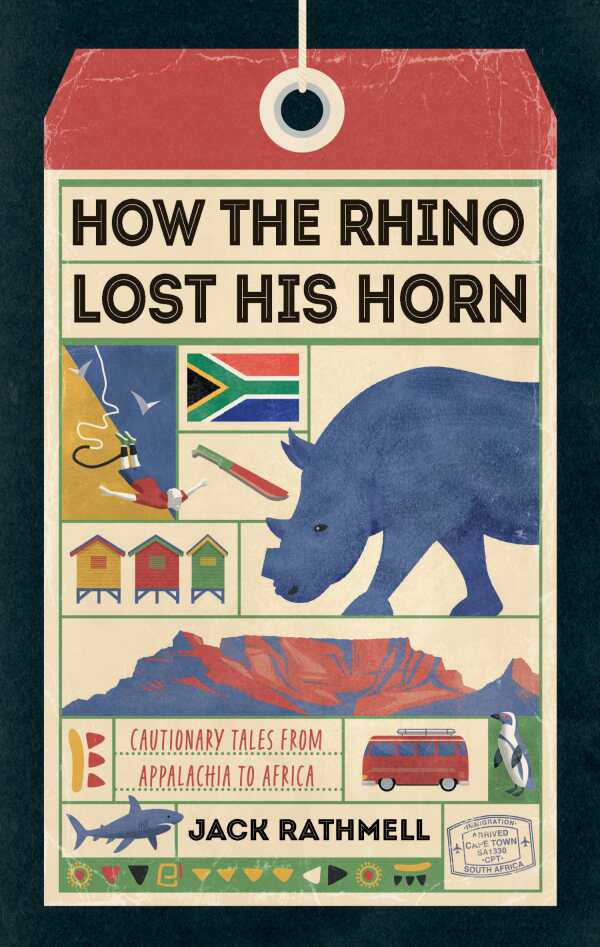How the Rhino Lost His Horn
Cautionary Tales from Appalachia to Africa
Grounded in keen observations and contextualized in a crash course of history, How the Rhino Lost His Horn is a knowledgeable, tantalizing travel memoir–cum–social critique.
Chronicling a journey from the Amish countryside to the South African suburbs, Jack Rathmell’s travel memoir How the Rhino Lost His Horn uses the everyday as an entry point to discuss changes in society and culture.
At the start of the book, Rathmell is out of his depth. He’s about to go cage diving with sharks and is fishing for an audience. How did he get here? His allusion to a personal relationship with Hans Zimmer proves as tempting as a tuna head to a shark in moving to the next chapter. There, he contrasts the just-released iPod with blue-collar values, and the social pressure to get a four-year degree with the emerging question of his generation: Is college worth it? Rathmell builds a sense of inevitability around his decision to drop out after a year of classes and use voluntourism as a way forward.
Broken into two acts, the book recounts Rathmell’s three stays in South Africa: first as a volunteer, then as a “freemover” studying abroad, and finally as a graduate student pursuing a writing degree. He opens by examining the hypocrisies, clichés, and power dynamics inherent in the industry of voluntourism, and is blunt about sharing moments of self-inflicted social wounds later in the book.
In describing his aerial approach to Cape Town, Rathmell uses the geography as an opportunity to share information about the violent racial past and present of the region. Further recollections of the wildlife and landscapes experienced in Africa follow this pattern. Reminiscent of a wandering naturalist’s observations as he hunts for daisies and nodding to the cheeky humor found in nature documentaries, Rathmell’s writing is grounded in social observations and contextualized in a crash course of history, even when he describes the rotting remains of a seal.
From the start, the book moves smoothly from story to story, arranging observations into broader themes. The breaks between chapters feel natural, and though each anecdote stands alone, callbacks to life in Pennsylvania, to beautiful hikes, and to jobs Rathmell worked all function as connective tissue that turns the book from a collection of essays into a unified whole.
By its midpoint, the text has fallen into a comfortable cadence. Its storytelling strengthens once it stops relying on sarcastic asides and edgy declarations to create interest and allows Rathmell’s reflections on what’s happening to generate interest instead. This also opens space for his pointed and often funny descriptions of the interesting people he meets in South Africa.
Indeed, the people Rathmell introduces throughout his memoir are fleshed out in a humorous and vivid manner, with focus placed on their archetypal qualities. Chet evokes a fraternity member as a rich boy whose appetite for alcohol and sex keeps his roommates from sleeping. Brittany is a soul sister to a trio of girls who get questionable tattoos in her memory when she leaves. Cheryl and Fergus are a mother-son duo who justify any and all antilandlord arguments. These relationships are used as openings to critique a stereotypical type of masculinity, to examine friendships formed over short intervals, and to discuss hierarchies of South Africa.
With layers of humor, introspection, and social observations scaffolded by historical facts and current events, How the Rhino Lost His Horn is an inviting memoir about being alive in contemporary times.
Reviewed by
Aerin Toskas
Disclosure: This article is not an endorsement, but a review. The publisher of this book provided free copies of the book and paid a small fee to have their book reviewed by a professional reviewer. Foreword Reviews and Clarion Reviews make no guarantee that the publisher will receive a positive review. Foreword Magazine, Inc. is disclosing this in accordance with the Federal Trade Commission’s 16 CFR, Part 255.

